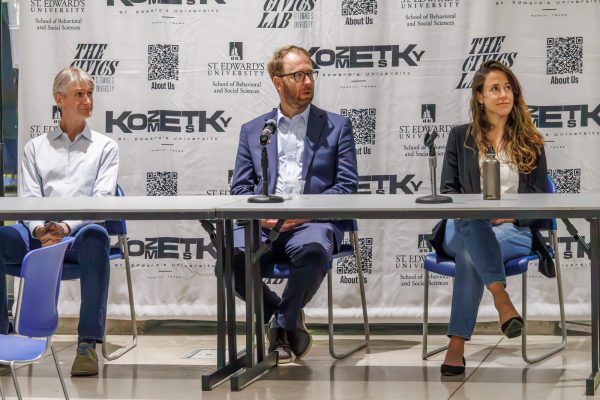Administration confirms fiscal changes resulting from COVID-19 via virtual briefings
Decrease in operating budgets, deferral of capital and infrastructure projects and preservation of endowment are just a few of many changes made.
On May 12, University President George Martin held two virtual briefings with university employees to explain challenges faced as a result of COVID-19 and resulting changes. Further information was provided in a webinar held on May 19.
The plan, presented to the Board of Trustees last Friday, includes a significant workforce reduction along with other changes in an effort to avoid a budget deficit in Fiscal Year 2021 and combat a projected 12% enrollment revenue decline, according to an email sent out by President Martin. This falls below the American Council on Education’s estimation of up to 15% enrollment decline.
A press release detailing plans for the 2021 fiscal year was released on May 13.
Senior Director of Communications Mischelle Diaz says that no area of the university went untouched when it came to budget cuts. While the official headcount of staff and faculty laid off from various departments is undisclosed, there has been a 10% loss, according to an email from President Martin. This loss includes some non-tenure track visiting faculty as well as the discontinuation of some academic contracts.
Prior to any official announcements from the university, news of the elimination of the School of Human Development and Education broke on Twitter on May 12.
So far, other confirmed changes due to budget cuts include the following:
- Discontinuation of five NCAA athletic programs and transition of the cheer team to club sports (announced last month)
- Elimination of the School of Human Development and Education (which includes teacher education, kinesiology, and graduate programs)
- Elimination of the Music Department
- Consolidation of OIT and the Munday Library
- Consolidation of Student Transitions, Student Activities and Family Engagement offices
- New health services partnership Baylor Scott & White with priority access
- Budget cuts within UPD, HR, facilities and custodial
- Residence Life staff reduction
- HCC staff reduction
- Elimination of St. Edward’s presence in Angers, France
- Elimination of the Center for Ethics & Leadership
With the loss of the School of Human Development and Education, the kinesiology major will now be offered through the School of Natural Sciences beginning in the 2020-2021 academic year with no curricular changes made to the program.
The Bachelor of Science in Interdisciplinary Studies for EC-6 elementary teacher preparation will no longer accept new students beginning this fall, meaning students who are already enrolled will be able to finish their degrees through a teach-out program. Students seeking or pursuing a minor in teacher education will not be affected by the loss of the School of Human Development and Education as the minor remains.
The Women’s Studies minor and Chicanx and Latinx Studies minors will remain.
In addition, students will no longer be admitted to degree programs in grades 4-8 mathematics, science, social science or English/language arts, according to an email from Dean of School of Human Development and Education Glenda Ballard. Students currently enrolled will be given “full support” to complete their degrees.
According to Diaz, students will now have to commute to the downtown Baylor Scott & White facility to receive medical care, which is about seven minutes by car and about an hour walking distance. Baylor Scott and White will provide students with “a broader range of medical services,” according to the press release. At the May 19 webinar, it was confirmed that some counseling services will continue to be offered at the HCC with in-person and telehealth options.
As for the consolidation of Student Transitions, Student Activities and Family Engagement offices, Diaz said it has “resulted in some staff eliminations.”
Residence Life staff has also been reduced in order to maintain social distancing with on-campus housing. While exact numbers were not disclosed, the decision has resulted in fewer live-in professional staff. “As the University prepares for a safe, socially distanced fall semester, that means that there will be lower density in the residence halls,” Diaz said.
With the Munday Library and OIT consolidation comes the implementation of a Learning Commons model, which includes a 24-hour access card system and a liquidation of some physical collections, according to Diaz. The new model is expected to still include the Writing Center and Digital Media Center, with the addition of the Student Success Center and Student Academic Support Services. The Student Success Center will also move towards providing more resources for upperclassmen starting in the fall.
Elimination of the Music Department has resulted in discontinuation of the music minor. Most music courses will no longer be available, according to an email from Dean of Arts and Humanities Sharon Nell. This includes groups like Orchestra, Jazz Band, Choir, Madrigal Singers and Mariachi Band as there are no longer staff to support them. Voice classes will still be available for theater arts and acting majors. The musical theater minor also remains.
Diaz says that the financial decisions being made by the university are preventative.
“I think that all of these cuts can make people think, ‘The university is in trouble,’ but really, I think a more appropriate way to look at it is the university is being proactive,” Diaz said.
The university will be making changes to maintain social distancing, including allowing only one resident per dorm room, reduced class sizes and reduced dining hall seating. Athletics and RecWell facilities will also follow social distancing and safety protocol including limited fans and regular health checks. Daily cleaning will take place throughout campus along with access to self-service disinfection, new signage and reduced density furniture.
UPD staff size will remain the same and SafeWalk SEU will continue when classes begin in the fall.
During the webinar, Martin gave examples of universities that have also been hit hard with financial burdens due to the COVID-19 pandemic, including the University of Michigan, Baylor and Rutgers.
“Our situation is not unique,” Martin said. “Many other universities, large and small, have recently made dramatic budget and staffing decisions in response to the uncertainties which currently confront higher education and our entire country.”
The information provided at the webinar was based on questions sent to administration. The university will provide monthly updates to the St. Edward’s community as more questions come in. Students can submit questions through a student concern form or by emailing administration staff directly.

Hey everyone! My name is Gianni Zorrilla. I study communication and journalism and digital media here at St. Edward’s and am one of the Editors-in-Chief...









